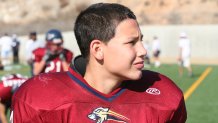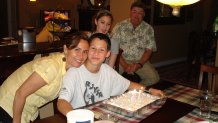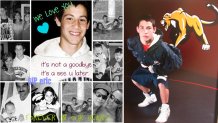July 23, 2009, is a day that changed Rhina Paredes-Greeson’s life forever.
Her family was preparing to go on vacation. Her son, Eric Parades was just 15 years old, a sophomore at Steele Canyon High School.
“He was beautiful, perfectly healthy. He was a multi-sport athlete. He played football and he wrestled,” she said.
On that day, nearly a decade ago, Eric Parades collapsed on the kitchen floor and died of sudden cardiac arrest.
“So how do you explain a healthy 15-year-old, you see him one moment and then you get a thousand million phone calls that he's at the hospital and that you need to rush in. And he passed. It was just unbelievable.” Paredes-Greeson said.

It was determined that Eric Paredes had a fatal heart arrhythmia that his parents didn’t know about.
Local
“We truly believe that if Eric would have had an EKG, maybe, perhaps we would have found out that Eric had that fatal arrhythmia and we probably could have done something about that,” his mother said.
Paredes-Greeson, who is a registered nurse, resolved to use her grief for good.
“We knew that there were kids that were dying from sudden cardiac arrest and Eric's dad and I felt like we needed to do something about that,” she said. “We couldn't imagine other parents going through this grief and nightmare.”
The couple wanted to offer free heart screenings for young adults and help families identify potentially fatal heart conditions in their children. Paredes-Greeson said she consulted the lead cardiologist where she worked, Dr. John Rogers, “And he looked at me straight-faced and said, ‘You have no idea but I have always wanted to do this.'"
Eric Paredes’ parents worked to connect doctors, clinicians and volunteers to form the Eric Paredes Save A Life Foundation, one-of-a-kind program in San Diego County.
“We are the only organization that does free heart screenings for teens,” Paredes-Greeson said.
Since it began, the organization has hosted 55 screenings for young adults ages 12 to 25. In February, 2019 they screened their 30,000th young adult. Eric Paredes' mother attends every screening, typically wearing a button with Eric’s picture.
Participants are screened with the help of 150 volunteers. They use EKGs and echocardiograms, tests that aren't required as part of a standard physical.

“When you take your children to a pediatrician or to their doctor for a well checkup or pre-participation sports physical, they never do an EKG. They never do a cardiac screening because that's not part of it. So this is why we do heart screenings to fill that void,” Paredes-Greeson said.
According to Paredes-Greeson, one of every 300 kids screened is found to have an abnormality that puts them at risk for sudden cardiac arrest.
Over the years EP Save a Life has helped alert more than 200 kids of their heart abnormalities.
Click here to register your child for an upcoming screening.
“I always say that I feel like God is present when we do a screening,” Paredes-Greeson said. “He has to be there because there is no other way that we can screen a thousand kids in one day.”
EP Save a Life is able to offer the screenings for free through the help of grants, donations and community partnerships. And the group is now offering more than just screenings, it's working to install automated external defibrillators (AEDs) in local schools. Click here to find out more about the EP Save a Life's AED program.
The EP Save A Life team is also working for legislative change to help create awareness that will protect young adults. Assembly Bill 1639, the Sudden Cardiac Arrest Prevention Act, was passed in 2015. It requires all schools that sponsor sports activities to provide parents with information requiring their signature, explaining about signs and symptoms of sudden cardiac arrest. There are more initiatives in the works. Click here to find out more about those initiatives.

Although the young man this organization was named after will never know the profound impact this group has had on so many families, Paredes-Greeson is hopeful Eric's legacy will live on through this gift of awareness.
It’s a gift that could potentially change the story of another family like hers.
“It's been 10 years and I'm still here crying,” Paredes-Greeson said. “I have a lot more joyful days now than before, but still, there are times where I just miss him so much every day and I wish he was here.”
“I've had so many amazing letters written by parents of kids who have been found at risk, thankful that they have their children,” she added. “They say thank you for giving them the gift, the gift of their kids."



